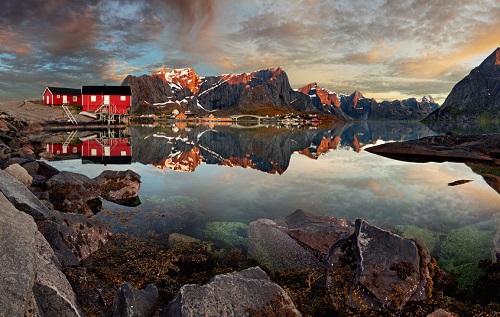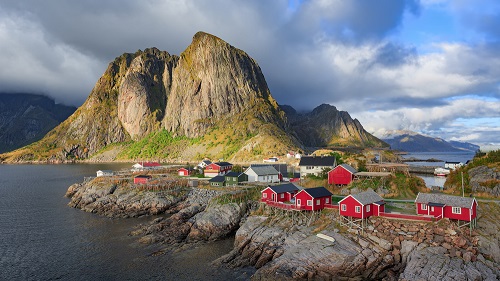Norway is a Scandinavian country that’s full of rocky mountain peaks, icy glaciers, and deep coastal fjords. Norway isn’t only renowned for being the historic home of the fearsome vikings, but also for its thriving economy – it was declared the world’s richest country in 2018 by The World Bank. The World Economic Forum says that Norway is the wealthiest and most inclusive country in the world. The country is also consistently ranked in the top 5 happiest countries in the world by the World Health Organisation.
Renting property
The rental market in the main cities of Norway is driven by students, young professionals and expats. Quality rentals are highly sought after and difficult to find. Outside of the cities, in small towns and villages, the rent may be lower, but there is less industry.
What are typical lease terms?
You may come across some terms that you are not familiar with when looking at rental advertisements. The most common of which arehybel (a studio apartment or bedsit, popular among students) and kollektiv (essentially a shared house).
One thing to mentally prepare yourself for is the high deposits that come hand in hand with renting in Norway. A deposit equal to three months’ rent is not uncommon, in addition to the first month’s rent paid in advance. By law, the landlord cannot demand a deposit that exceeds the equivalent of six months’ rent. If you think you will struggle with the deposit, but already have a employment contract, it is worth speaking to your employer, as they may be able to act as your guarantor or lend you the money.
Furnished and unfurnished properties are both options when it comes to renting in Norway. However, make sure that, if you are renting a furnished home, you ask for (and check) an inventory list. Once you have found a room or a property that you like, you will need to act fast, particularly if you are looking to rent in one of the major cities, as properties are high in demand and go very quickly.

Where can expats find details of properties to rent?
You may want to look at some of the popular websites that the locals use, such as Finn and Hybel. Additionally, make use of any contacts you have in the area, and speak to your company HR department. Many Norwegians find a place to rent through word of mouth or by posting and responding to adverts.
What are typical rental prices in major expat destinations?
According to online database Numbeo, rent in Norway is typically 3.58% higher than in the United Kingdom. On average, a one-bedroom apartment in the city centre will set you back approximately 10,554.23 KR (equivalent to around £800 or $990), whilst a similar apartment outside of the city centre would cost closer to 8,185.40 KR (£620 or $767). A three-bedroom apartment in a Norwegian city typically costs 17,083.65 KR (£1,296 or $1,601), with its more suburban counterpart costing on average 13,418.68 KR (£1,018 or $1,257).
Are there any challenges/problems in the rental process that expats often encounter?
The government has been cracking down of late on short-term rentals. The aim of this is to try and reduce the impact of investors buying up numerous apartments and renting them out, which is damaging local hotel businesses. It is also worth noting that there is a limit to the number of days per year that homeowners can rent out their homes on a short-term basis. In addition, they are faced with harsher taxation laws, in order to curb the desirability/profit margin.
Buying property
Despite property prices in Norway growing steadily more expensive, the country has one of the highest levels of home ownership in the whole of Europe. It is estimated that almost 80% of Norwegians own their own homes. The government has been purposely introducing initiatives to aid Norwegian citizens in becoming homeowners.
What is the typical house buying procedure?
In Norway, the deal is essentially made as soon as the seller accepts your offer. You shouldn’t make an offer unless you are sure that your finances are in order and you have a genuine intention to purchase the property. It is worth noting that the whole buying process will move a lot quicker if you have a residence permit.

Properties in Norway usually go on the market, and then there is an open house viewing on a set date, where anyone can view the property. The bidding is usually opened as soon as the next day. Bids for properties can be done in person or digitally.
The bidding is usually fast-paced and competitive, so decide beforehand what the maximum is that you’re prepared to bid. The real estate agent represents both the seller and the buyer throughout the process, but the agent’s fee is most typically paid by the buyer. The agent should guide you through the process and organise for the contract to be drawn up. During the signing of the contract, the seller will issue the deed of the property to the buyer. The deed will be kept by the agent until its registration. Upon registration, a certified copy of the land register is issued by the registration authorities. The completed sales contract is usually retained by the real estate agent.
Additional costs typically add up to around 3.75% to 5.62% of the property price. Additional costs usually include stamp duty (2.5%), a registration fee (525 KR or £40 or $50), and the real estate agent’s fee (1% to 2.5% + 25% VAT).
Do local banks issue mortgages to foreign nationals?
There are currently no legal restrictions on foreigners who are looking to purchase property in Norway.
Mortgage (boliglån) repayment periods can be long, but if you are buying for the first time, you may benefit from a first-time buyer mortgage, which is a plan with the same interest rate for the full period. First-time buyers in Norway can often borrow up to 100% of the purchase price.
You will need to take your tax return and/or pay slip to the bank to see how big a loan you qualify for and what interest rate they can offer you. At Finansportalen, you can search for which banks offer the lowest interest rates.
The Norwegian State Housing Bank (Husbank) also provides grants for building new houses or for the renovation of older properties. There are, however, strict guidelines and criteria that must be met. More information on the schemes available can be found on their website.

